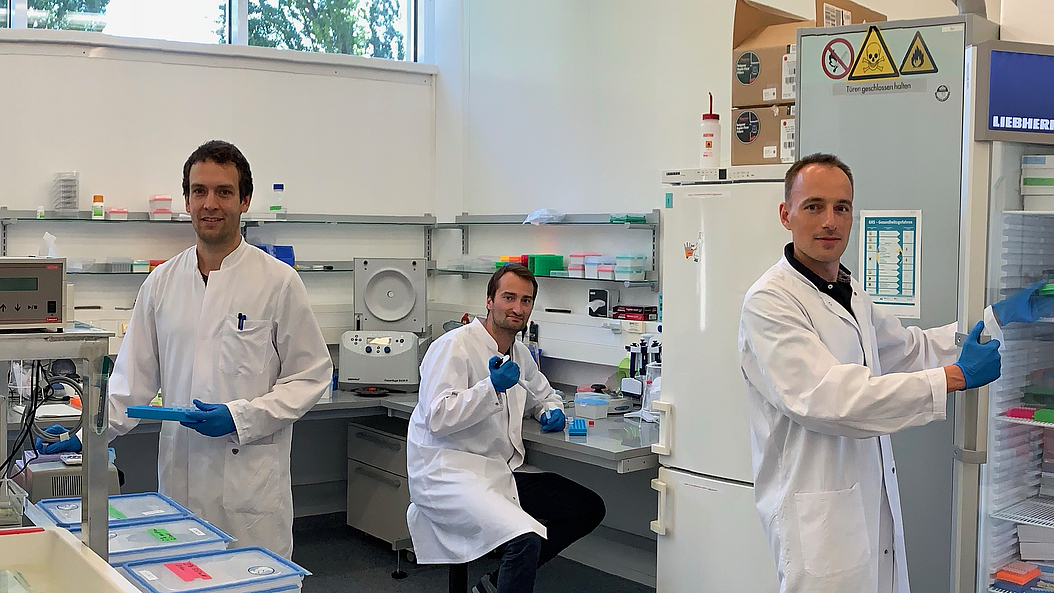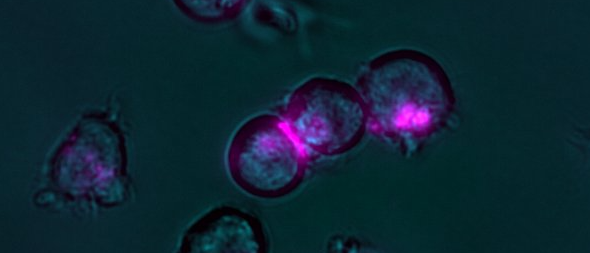Artificially produced antibodies can connect immune cells to tumor cells and thus ensure that the tumor is attacked by the immune system. At present, however, this kind of treatment often results in side-effects, since healthy cells are attacked as well. A DNA nanoswitch developed by researchers at the Technical University of Munich (TUM) as part of the LOGIBODY project may help here. The nanoswitch recognizes when the antibody is connected to a tumor cell and only then allows it to recruit the immune cell. The researchers have now been honored with the Innovation Prize of the German BioRegions for their development.
When the human immune system recognizes that pathogens have penetrated the organism, it mobilizes specialized immune cells which reproduce in large numbers and together eliminate the germs. The immune system recognizes the intruders based on typical molecular structures on their surface. This immune mechanism often does not work with tumor cells, since the cells are not recognized as degenerated and can thus reproduce unimpeded.
The goal of many modern cancer therapies is to make the immune system attack the tumor nevertheless. "Here one strategy is to develop antibodies which connect immune cells to tumor cells," explains Jonas Funke, a scientist at the Laboratory of Biomolecular Nanotechnology and the Munich School of BioEngineering (MSB) – both at the Technical University of Munich (TUM). As a result, the two cells are brought so closely together that the immune cell attacks the tumor cell.
This approach – already being applied in clinical practice today – has however an essential disadvantage: The structures on the tumor cells to which the antibodies are to bind resemble structures found on many healthy cells. Therefore, the healthy cells are also attacked by the immune system, which in some cases can lead to severe side-effects.
DNA activates the medication's effect
Together with their mentor Hendrik Dietz, Professor of Biomolecular Nanotechnology and Principal Investigator at the MSB, in the course of their LOGIBODY project Jonas Funke, Klaus Wagenbauer, and Benjamin Kick have developed a possible strategy. "We combine the antibody with a nanosized switch which recruits the immune cells only after the antibody has connected to a tumor cell," says Funke, explaining the principle. If the antibody docks onto a healthy tissue cell the switch remains off – the antibody cannot connect with immune cells and the tissue cell remains undisturbed.
The switch used consists of artificial DNA which in this case does not act as bearer of genetic information, but rather as construction material for nanostructures. These nanostructures are produced using the DNA origami process, in which nanometer-sized objects and machines can be made out of DNA – in large quantities, with very high precision and according to a specified design. This technology was developed in large parts at the Laboratory of Prof. Dietz.
Objective: Developing medications with pharmaceuticals companies
The researchers are currently testing the antibodies with the innovative nano-switches very successfully in cell cultures – mouse model investigations are to follow. "In the long-term, we plan to found a company and to cooperate with pharmaceutical companies experienced in the field of antibody development to create new medications," Funke says. They are already on the lookout for partners in the industry. "At the same time, we're looking for dedicated colleagues who would like to join our team – they could work on a Master's or Bachelor's degree thesis in our group, for example" the researcher adds.
Award-winning research
LOGIBODY is one of the three projects to win the Innovation Prize of the German BioRegions, awarded at the end of May 2020 by the regional initiative for the promotion of economic use of modern biotechnologies in Germany. The cash prize of 2000 euros is presented for outstanding ideas and patents with major economic potential from the life sciences. Last year the project was honored with the M4 Award, presented by BioM, the network organization of the biotechnology sector in Munich and Bavaria and supported by the Bavarian Ministry of Economic Affairs, Regional Development and Energy.

More Information
Professorship of Biomolecular Nanotechnology (Prof. Hendrik Dietz)
Press Release Innovation Prize of the German BioREgions 2020 (in German)
More Information about the Innovation Prize of the German BioRegions (in German)
More Information about the m4 Award
Related MSB News:
25 Oct 2019 | Developing a nanoswitch for antibodies - research team mentored by MSB-PI Hendrick Dietz receives m4 Award
Media Relations MSB
Dr. Paul Piwnicki
Media Relations Manager MSB
Phone: +49 89 289 10808
E-Mail: paul.piwnicki@tum.de
Scientific Contact
Dr. Jonas Funke
jonasfunke@mytum.de
Dr. Benjamin Kick
Email: benjamin.kick@tum.de
Dr. Klaus Wagenbauer
Phone: +49 89 289 12814
Email: klaus.wagenbauer@ph.tum.de
